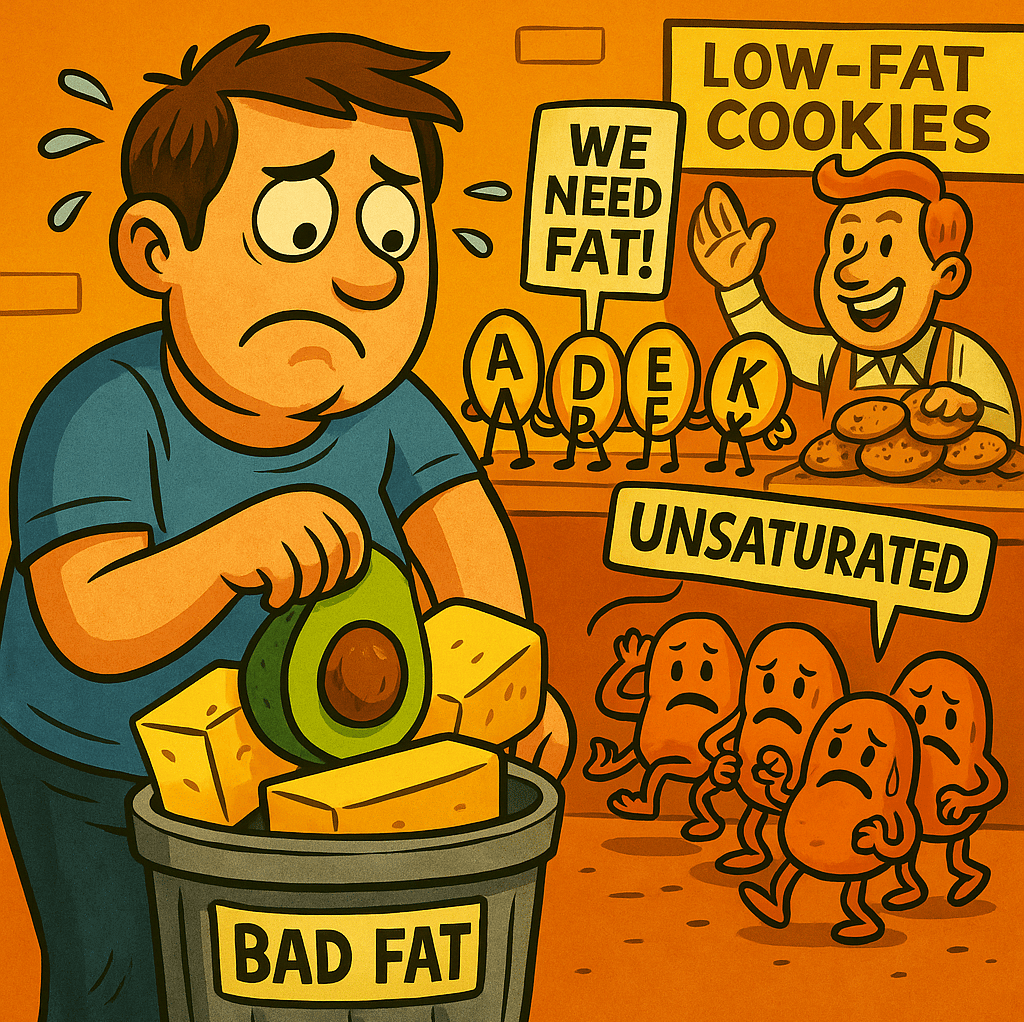Nutrition Myth #10: You Have to Cut Out All Fat to Be Healthy
For years fat was blamed as the enemy, but your body needs it for hormones, vitamins, and energy. Learn the truth about dietary fats, the difference between healthy and harmful ones, and why balance matters most.
NUTRITION
Adi English
3 min read


🧈 Nutrition Myth #10: “You Have to Cut Out All Fat to Be Healthy”
📖 Article (~330 words)
For decades, fat was treated like the villain of nutrition. People thought if you ate butter, it went straight to your arteries like pouring cement in a pipe. Snack companies went wild, making everything “low-fat” or “fat-free,” which usually just meant “full of sugar instead.”
Here’s the truth: dietary fat is not your enemy. In fact, you need fat for hormones, brain function, energy, and absorbing vitamins like A, D, E, and K. Without fat, your body is basically running software with missing files - it won’t work right.
There are different kinds of fat. Unsaturated fats (like those in olive oil, nuts, and avocados) are linked to heart and brain health. Saturated fats (like butter and cheese) aren’t the devil, but too much can be a problem. Trans fats (often found in old processed foods) are the real bad guys - they increase heart disease risk.
Cutting out fat completely doesn’t make you healthier - it makes you tired, hungry, and possibly nutrient-deficient. What really matters is the balance of macronutrients (protein, carbs, and fats) and the total quality of your diet.
So why did this myth last so long? Because the food industry loved selling “low-fat” cookies and yogurts, even though they were basically sugar bombs. And let’s be honest: “fat makes you fat” sounds simple, but it’s completely wrong. Extra calories make you fat, not fat itself.
Eating fat doesn’t clog your arteries like bacon grease in a sink. If fat really made you fat, avocados would’ve destroyed California years ago.
Takeaway: You don’t need to fear fat. You need the right kinds, in the right amounts, as part of a balanced diet.
🗂 Vocabulary
Dietary fat – the fat you get from food.
Simple: Fat from things you eat.
Example: Nuts and oils contain dietary fat.
Student example: ____________
Hormones – chemical messengers in the body.
Simple: Signals that control growth, hunger, and mood.
Example: Fat helps your body make hormones.
Student example: ____________
Vitamins – nutrients needed for health.
Simple: Substances that keep your body strong.
Example: Fat helps absorb vitamins A, D, E, and K.
Student example: ____________
Unsaturated fats – healthy fats from plants and fish.
Simple: Good fats in olive oil, nuts, and salmon.
Example: Unsaturated fats help your heart.
Student example: ____________
Saturated fats – fats from meat and dairy.
Simple: Fats in butter, cheese, and steak.
Example: Too much saturated fat isn’t ideal.
Student example: ____________
Trans fats – artificial fats made in factories.
Simple: Fake fats in old junk food.
Example: Trans fats are harmful to health.
Student example: ____________
Nutrient-deficient – lacking important nutrients.
Simple: Missing what your body needs.
Example: Low-fat diets can make you nutrient-deficient.
Student example: ____________
Macronutrients – protein, carbs, and fats.
Simple: The big nutrients you eat daily.
Example: A balanced diet has all three macronutrients.
Student example: ____________
Processed – food changed in factories.
Simple: Junk food like cookies and chips.
Example: Trans fats are found in processed food.
Student example: ____________
Takeaway – the most important lesson or point.
Simple: The main thing to remember.
Example: The takeaway is fat is needed in your diet.
Student example: ____________
📝 Exercises
Comprehension
What did people wrongly believe about fat?
Why does your body actually need fat?
What are the three main types of fat?
Why did the “low-fat” craze become popular?
What is the main takeaway of this article?
Multiple Choice
Which vitamins need fat to be absorbed?
a) A, D, E, K b) B, C, D, E c) All vitamins d) None
Which fats are healthiest?
a) Unsaturated fats b) Trans fats c) All fats d) Saturated fats only
What are trans fats?
a) Natural fats b) Artificial fats c) Healthy oils d) Vitamins
What really makes people gain fat?
a) Eating avocados b) Extra calories c) Unsaturated fats d) Missing vitamins
What does “nutrient-deficient” mean?
a) Missing important nutrients b) Eating extra nutrients c) Too many fats d) Having strong health
Fill in the Blank
Fat helps the body make ______.
Without fat, you can’t absorb certain ______.
Olive oil and nuts contain healthy ______ fats.
Too much ______ fat isn’t ideal.
The main ______ is that fat isn’t the enemy.
True/False
Fat is completely bad for your body.
Unsaturated fats are good for heart health.
Saturated fats can be eaten but not too much.
Trans fats are the healthiest kind.
Calories - not fat itself - cause fat gain.
Discussion
Why do you think people feared fat for so long?
What foods with healthy fats do you eat?
Why are trans fats considered dangerous?
Do you prefer low-fat or balanced foods?
What is your personal takeaway from this article?
